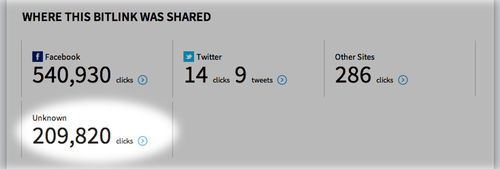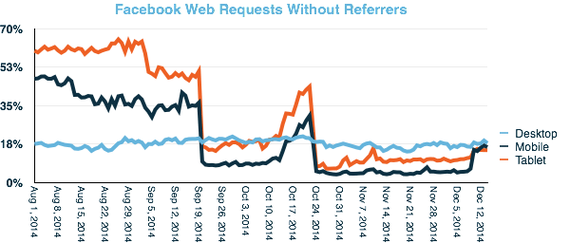Since 2008, Bitly has been known for offering unique insights and analytics into how content is shared across the web. Seeing more than 600M links shortened every month, and processing 8B clicks on those links, we have incredible insight into behavior on the web. As social has evolved, we learned that traffic from specific sharing activities occasionally ends up being reported as an undefined traffic source - leaving marketers and social media managers worried the data they have been relying on is wrong.
Back in August, Buzzfeed approached both Bitly and Facebook questioning the discrepancies they noticed between our analytics platforms. Like many other brands and publishers, Buzzfeed uses Bitly to track unique URLs, allowing them to track sharing activity on different platforms. Because Buzzfeed was individually tracking the Bitlinks used on their Facebook posts, we were able to compare our Bitly stats to Facebook analytics, expecting to see that our traffic would match Facebook's platform.
Instead, we found that there was a significant gap in traffic that wasn't attributed to Facebook - even though the Bitlinks we were monitoring were exclusively shared there.
Once we realized this, we began working with Facebook directly to understand the cause of the problem. We segmented all the traffic without referral information into separate groups for the Facebook iOS app, Android app and general web traffic. We further segmented general web traffic to identify specific platforms or devices that had a disproportionate amount of the unidentified traffic.
Facebook iOS
When we first ran this test on iOS, we consistently found that 12-13% of traffic from within the Facebook webview had no referrer information. Below is a chart for the past six Facebook iOS app versions and the percentage of clicks that did not have referrer information. This data is based on two billion measurements across the Bitly platform in November and December:

Once identifying the problem, Facebook proactively took measures to address these discrepancies. Facebook was able to identify and push out a fix for this in app version 18 (released on Nov 13th, 2014). Since rolling out the update, the number of iOS requests without referrer data has dropped significantly.
Facebook Android
In parallel with this effort, Facebook released a major update to the Android app. This update in app version 20 changed behavior on Android 4.4+ devices - instead of opening in the default browser, these devices would open the links in a webview inside of the Facebook app. This made it possible to definitively identify traffic from the Facebook Android app that unexpectedly didn't have a referrer.
The measurements below are from the Facebook Android app after the webview release on Oct 23, 2014 and are based on one billion measurements across the Bitly platform. While there is still a significant portion of Android traffic without referrers, Facebook has reported to be close on releasing a fix.
The final section of the test includes links that were opened directly in a browser (such as Chrome, Firefox or Safari) and not opened inside a Facebook app. It's useful to segment this traffic by the type of browser as those appear to change independently.
Because there is no information identifying Facebook beyond the referrer for web requests, we can measure the rate of unknown referrers on traffic through uniquely tagged Bitlinks that are explicitly shared only on Facebook.
When measured across 140 Million clicks on Bitlinks known to be shared only on Facebook, there is a clear change over time. Facebook is visibly improving their outbound link handling to consistently set referrer information. The rate of non-Facebook referrers for this dataset is 0.73% indicating this should be a very high quality signal for Facebook traffic.
On iOS Facebook has fixed issues causing undefined referrers, and they have reported to be close on a fix for Android. Web traffic from Facebook showed clear improvements in September for mobile and tablet browsers, but unattributed traffic from desktop browsers has remained largely unchanged at a rate of 17%.
Bitly is committed to empowering marketers to make better decisions by providing insight into the connected world. We will continue to work with Facebook and all social platforms to identify and improve areas where traffic isn't correctly attributed. Knowing the effectiveness of activity on different platforms is important for our customers to make effective choices in optimizing their strategies.


